HP Pavilion Aero 13 vs. Samsung Galaxy Book Go: Which should you buy?
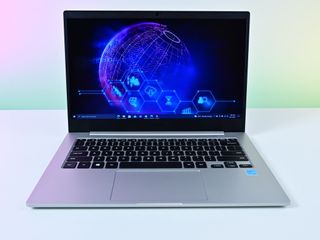
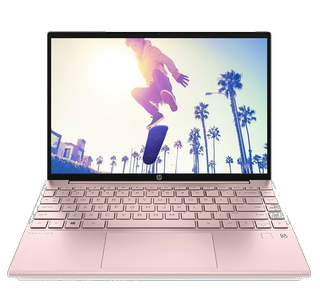
Best overall
The HP Pavilion Aero 13 dominates this matchup overall, featuring much better specs, a better display, and a stronger battery life while also remaining pretty budget-friendly. However, it is a little bit more expensive, and there's also not an option here for 4G LTE like there is for the Samsung Galaxy Book Go.
For
- Better specs and display
- Better battery life
- More RAM and storage
Against
- More expensive
- No 4G LTE option
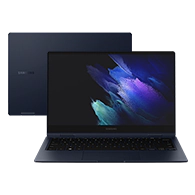
Best budget
The Samsung Galaxy Book Go is incredibly affordable and decently capable, making it an excellent choice for people who don't have much to spend on a new device. It also can be configured with 4G LTE. Its performance, display, and battery life falls far behind what the HP Pavilion Aero 13 offers, though.
For
- Less expensive
- Has a 4G LTE option
Against
- Worse specs and display
- Worse battery life
- Less RAM and storage
Both the HP Pavilion Aero 13 and the Samsung Galaxy Book Go are good laptops, but at the end of the day, we think the Aero 13 is the better option due to its significantly better performance, display, and battery life. These advantages make the Aero 13 faster and more enjoyable to use. Don't overlook the Samsung Galaxy Book Go if your budget for a new laptop is minimal, though, as it delivers a solid experience for a rock-bottom price.
Pavilion Aero 13 vs. Galaxy Book Go: Performance or price?
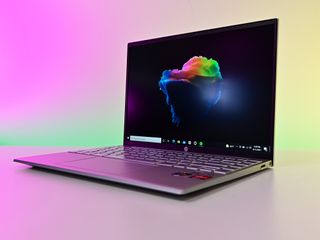
When it comes to specs and performance, the HP Pavilion Aero 13 is the clear winner of this duel. Its 5000-series Ryzen CPUs vastly outperform the Qualcomm Snapdragon 7c in the Samsung Galaxy Book Go, and the Aero also comes with a significantly larger amount of RAM and storage (its storage is also faster since it uses a traditional SSD instead of eUFS). Its anti-glare 400 nit display on is much brighter and can fight off sun glare much better than the Samsung Galaxy Book Go's can, and it also has a superior color gamut. The Aero also has Wi-Fi 6 and Bluetooth 5.2, giving it better connectivity overall. It even outperforms the Galaxy Book Go in active use battery life tests, getting up to 10 hours compared to the seven hours my colleague Daniel Rubino reported in his review of the Galaxy Book Go.
| Header Cell - Column 0 | HP Pavilion Aero 13 | Samsung Galaxy Book Go |
|---|---|---|
| CPU | AMD Ryzen 5 5600UAMD Ryzen 7 5800U | Intel Core i3-10110UQualcomm Snapdragon 7c Gen 2 |
| GPU | AMD Radeon Graphics | Qualcomm Adreno |
| Memory | 16GB | 4GB8GB |
| Storage | 256GB SSD512GB SSD1TB SSD | 64GB eUFS128GB eUFS |
| Display | 13-inch 1900x1200 anti-glare display (400 nits)13-inch 2560x1600 anti-glare display (400 nits) | 14-inch 1920x1080 HD display (238 nits) |
| Audio | Dual speakers by B&O with HP Audio Boost | Dual speakers with Dolby Atmos |
| Biometrics | Fingerprint reader | None |
| Ports | 1x USB-C2x USB-A1x HDMI 2.01x AC smart pin1x 3.5mm headphone/mic combo | 2x USB-C1x USB-ANano Security slotnano SIM1x 3.5mm headphone/mic combo |
| Connectivity | Wi-Fi 6Bluetooth 5.2 | Wi-Fi 5Bluetooth 5.04G LTE (optional) |
| Battery | Up to 10 hours | Up to 7 hours |
| Dimensions | 11.72 x 8.23 x 0.67 inches | 12.8 x 8.9 x 0.6 inches |
| Weight | 2.20 pounds | 3.04 pounds |
The Samsung Galaxy Book Go only has two things going for it: a rock-bottom price tag and the option to configure it with 4G LTE. The low price makes the device an attractive option if you have very little money to spend on a new laptop, especially since it delivers solid overall performance for basic productivity and web browsing. The option for 4G LTE will benefit people who want (or need) to use their laptop on the go, though it will raise the price.
Pavilion Aero 13 vs. Galaxy Book Go: Which should you buy?
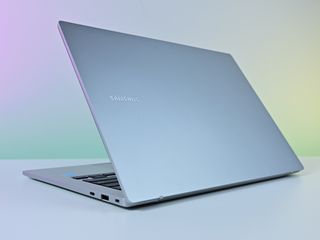
While both of these laptops are great for people on a budget, we feel that the HP Pavilion Aero 13 is the better choice. Even though it's a bit more expensive, the significantly better specs, display, battery life, and connectivity make the Aero 13 worth investing in. Faster performance and more versatility lead to a much better user experience, after all. It's easily one of the best Windows laptops you can get in the sub-$1,000 range.
If your budget is extremely tight, the Samsung Galaxy Book Go is a great alternative. It lags behind the Aero in terms of performance and features, but it's also incredibly affordable at $299. It's also decently capable for a laptop in this price range, meaning that you'll be able to tackle general productivity without too much trouble. Devices this inexpensive are generally disappointing, but the Galaxy Book Go is arguably one of the best budget laptops available.

The ultimate budget buy
The HP Pavilion Aero 13 dominates this matchup overall, featuring much better specs, a better display, and a stronger battery life while also remaining pretty budget-friendly. However, it is a little bit more expensive, and there's also not an option here for 4G LTE like there is for the Samsung Galaxy Book Go.

Small price, big value
The Samsung Galaxy Book Go is incredibly affordable and decently capable, making it an excellent choice for people who don't have much to spend on a new device. It also can be configured with 4G LTE. Its performance, display, and battery life falls far behind what the HP Pavilion Aero 13 offers, though.
Get the Windows Central Newsletter
All the latest news, reviews, and guides for Windows and Xbox diehards.
Brendan Lowry is a Windows Central writer and Oakland University graduate with a burning passion for video games, of which he's been an avid fan since childhood. You'll find him doing reviews, editorials, and general coverage on everything Xbox and PC. Follow him on Twitter.

